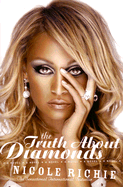Upon discovering that Nicole Richie (of "Nicole Richie" fame) was a New York Times Bestselling Author, I challenged myself to conquer the novel that brought her such a distinction, and to do so as objectively as possible, without simply writing it off as "Haha. Nicole Richie wrote a novel. Haha."
 The Truth About Diamonds is the fictional story of
The Truth About Diamonds is the fictional story of Basically, The Truth About Diamonds is #1stWorldProblems in novel form.
Oh! Did I forget to mention that there's a totally sweet collection of glossy photos of Nicole Richie looking drugged up and sad inserted into the middle of the book? No? Whatever.
I guess what I'm trying to say is that next time I decide to take on such a challenge: please, for the love of God, talk me out to it.
Rating
The Truth About Diamonds, by Nicole Richie
Story: 3.3
You know how there's that whole school of writers like Bret Easton Ellis who like to expose the corrupt and twisted amorality of the American Upper Class in their work? This book's is kind of like that. Except no one's really that corrupted or twisted or amoral (or that complex or interesting). You catch a few glimmers of these treats in the books "antagonists" — mostly PR spinsters and paparazzi, but even then, they're not that bad. Every time an event seems poised to send our main character plummeting to rock bottom, leaving the empathetic reader to pine, "Oh no! How will she ever make it out of this one?", the problem is neatly resolved within 4 pages. Oh no!
Seriously, there's even a passage that details some of the possible side effects of withdrawal from Xanax (this during Chloe's 6-page stint in rehab) that ultimately finishes with: "Fortunately, Chloe's Xanax addiction was not as severe as they come, so she never came close to ending it all." So much for drama and extreme human emotion. Oh well.
Style: 4
I give this book a 4 on style simply because a stylistic choice was actually made in writing it. It follows the same kind of narrative style as The Great Gatsby, where the First Person Narrator (in this case, Nicole Richie herself) relays the story of our protagonist (
General: 3.8
I mean, it's not a bad book I guess. It's just not particularly good, and I don't see a point to its existence other than paying for a new purse for Ms Richie. It wasn't necessarily a painful reading experience. Although in a way, I wish it had been — at least that way it would have been more dynamic. You can tell that Richie (assuming it was actually written by her, and not a ghostwriter) has personal stakes in the topic of drug addiction, because those moments in the book tend to have the presence and depth. But overall, there's no lesson, or message, or brilliant illumination of the human psyche, or really even a story, or any of those things that fiction is supposed do.
Overall: 3.7